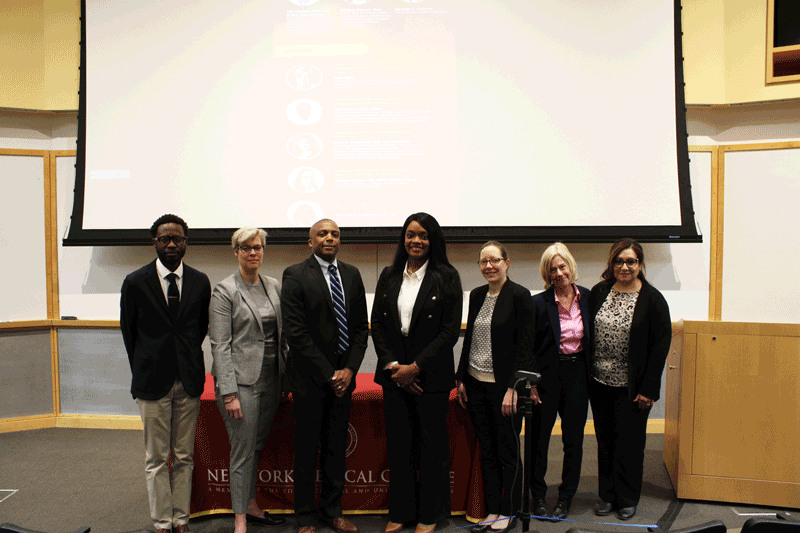NYMC and Westchester Medical Center Health Network Host Sixth Annual HeLa Conference
The HeLa Diversity, Equity and Inclusion Conference Focused on Strategies for Overcoming Health Inequities

The New York Medical College (NYMC) Office of Diversity and Inclusion and Westchester Medical Center Health Network (WMCHealth) presented the sixth annual HeLa Diversity, Equity and Inclusion Conference in-person for the first time since the pandemic on February 22. The hybrid audience listened to panelists discuss topics surrounding disparities and inequities in medicine from surgical procedures to the COVID-19 pandemic. View the video.
The conference opened with remarks by Mill Etienne, M.D. ’02, M.P.H., FAAN, FAES, vice chancellor for the Office for Diversity and Inclusion, associate dean for student affairs and associate professor of neurology and medicine, Matilde Roman, Esq., senior vice president and chief equity, inclusion and diversity officer at WCMHealth, and Sean S. Tedjarati, M.D., M.P.H., M.B.A., clinical professor and chair of the Department of Obstetrics and Gynecology, director of obstetrics and gynecology at Westchester Medical Center and MidHudson Regional Hospital, and chief clinical integration officer at WMCHealth.
“In honoring the life of Ms. Henrietta Lacks, it is important that we carefully look at health inequities and work together to knock down the barriers to better health in our communities. If we care about improving our institutions, we must scrutinize them to make them better,” said Dr. Etienne. He further drove home this point by quoting James Baldwin and said, “I love America more than any other country in the world and, exactly for this reason, I insist on the right to criticize her perpetually.”
Dr. Tedjarati discussed the implicit bias that medical professionals bring with them into the exam room and the effect those prejudices have on the patients they treat, shaping the state of public health.
“How do we look at ourselves in a critical way, but with thoughtful eyes?” said Dr. Tedjarati. “These are people who are meant to come and advance the betterment of the world, but somehow we’ve become blind to what occurs and perhaps our own biases. We have to foundationally change how we render services that are sustainable beyond a personality and person.”
Kathryn Martin, M.D., M.P.H., FRCSC, FACS, an attending pediatric surgeon at Maria Fareri Children’s Hospital at WMC, centered her panel on addressing structural barriers to optimize surgical outcomes. Ruth E. Alejandro, M.D. '03, FAAPMR, clinical assistant professor of rehabilitation medicine, School of Medicine (SOM) house advisor dean, director of pediatric rehabilitation at Blythedale Children's Hospital, pediatric rehabilitation medicine attending physician and brain injury medicine subspecialist presented her panel on health disparities in rehabilitation medicine. Rachelle J. Lodescar, M.D. '13, general surgeon in burn surgery and critical care medicine and attending physician at WMC, discussed the association between race and outcomes in the burn community. Latif Salam, M.D., FACP, clinical assistant professor of medicine at SUNY Downstate Health Sciences University and attending physician at the Department of Internal Medicine and Associate Program Director of Internal Medicine Residency Program at WMC, focused on the racial and socioeconomical impact of the COVID-19 pandemic. Mary Otto, medical journalist, author, and topic leader on oral health for the Association of Health Care Journalists, discussed of discrimination in dentistry from her book, Teeth: The Story of Beauty, Inequality, and the Struggle for Oral Health in America, which was the topic of the community read later that evening.
“This year’s distinguished speakers to not only brought awareness to the issues at hand, but also explored strategies for mitigating them,” said Wianda Jean, M.S., assistant to the vice chancellor for the Office of Diversity and Inclusion and coordinator for the event. “I believe that was the biggest take-away because it challenged the audience to consider the micro-level impacts that they can make in their own piece of this much larger puzzle, while the presenters provided tangible means of doing so. From pushing for changes in curriculum content, to lobbying efforts, our speakers left the audience with more than just information, but also a call to action.”
“Our panelists presented on the different disparities within medicine and about intervening after something has already happened," said Dr. Etienne. “What we need to do is go to the root cause and prevent these things from happening in the first place.”
The annual conference, named for Henrietta Lacks, aims to continue dialogue on research ethics, informed consent, privacy and compensation. Lacks was diagnosed with cervical cancer and died at the age of 31 in 1951. Her cancer cells—code named HeLa—were taken without her knowledge and became one of the most important tools in medicine. It was the first immortal cell line, or group of tissue samples that could survive in a lab and reproduce indefinitely, leading to advances including the polio vaccine, cancer treatments and in vitro fertilization.
